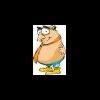შეტყობინებები: 25
ენა: English
ceigered (მომხმარებლის პროფილი) 11 ივნისი, 2010 12:43:09
qwertz:Regarding the rolling e-o "R". Even it is sung, I like the kind of "R" rolling which is Patrik is doing inside the Dolchamar songs.Is that not the normal Esperanta R?

qwertz (მომხმარებლის პროფილი) 14 ივნისი, 2010 18:43:00
ceigered:Probably, but I still will need lots of practice doing that pronouncation this way. But Dolchamar songs are a good source doing that excercises.qwertz:Regarding the rolling e-o "R". Even it is sung, I like the kind of "R" rolling which is Patrik is doing inside the Dolchamar songs.Is that not the normal Esperanta R?

gabadubo (მომხმარებლის პროფილი) 15 ივნისი, 2010 14:27:29
So I wouldn't focus too much on that R, because it's all about understanding each other. And with an approximant R (like in English) that goal will be surely reached.
qwertz (მომხმარებლის პროფილი) 15 ივნისი, 2010 15:08:34
gabadubo:Ik didn't think the pronounciation of the Esperanto-R would be so strict. In Dutch the majority of people are using the uvular trill /ʀ/ or the uvular fricative /ʁ/. And many of those people aren't capable of saying the tap, preferably used in Esperanto (and some Dutch), like just said: /ɾ/Thanks a lot, gabadubo. I bookmarked that.
So I wouldn't focus too much on that R, because it's all about understanding each other. And with an approximant R (like in English) that goal will be surely reached.

ceigered (მომხმარებლის პროფილი) 15 ივნისი, 2010 16:06:28
gabadubo:Ik didn't think the pronounciation of the Esperanto-R would be so strictWell in practice it certainly isn't, but I believe the idea is to help learners stick to a more traditional and not-hard-to-miss standard, just to help cut down the opportunities for mishearing.
But yeah, in practice, I've heard many different R's (or lack of them, good ol' Melburnuloj!
 ), and understood perfectly despite learning EO with a rolling alveolar R, so it's certainly no big problem (with 99.9% of people - it's that 0.1% that might present a problem).
), and understood perfectly despite learning EO with a rolling alveolar R, so it's certainly no big problem (with 99.9% of people - it's that 0.1% that might present a problem). 

